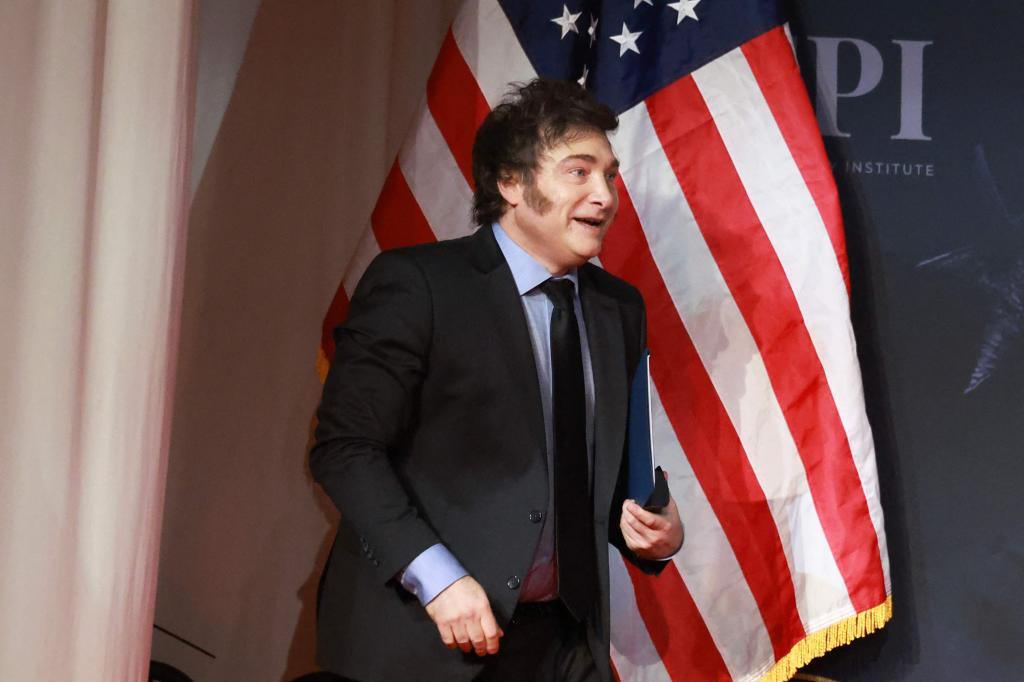Donald Trump and Javier Milei aspire to create a "league of conservative nations" or a populist alliance to dismantle the UN Sustainable Development Agenda 2030 and withdraw from the Paris Agreement on climate change. Hours before their meeting in Florida with the US president-elect, the Argentine president withdrew his delegation from the COP29 in Baku as a show of loyalty to Trump and in open defiance of the international community.
Milei, highlighted by Trump as "one of my favorite presidents," has been one of the first leaders to visit Mar-a-Lago mansion and has taken the opportunity to discuss trade agreements with Washington and seek support in his negotiations with the International Monetary Fund (IMF). The Argentine president will also attend the Conservative Political Action Conference (CPAC) in passing.
Milei is convinced that Donald Trump's return to the White House will make possible the creation of an ideological and global power axis between Washington and Buenos Aires. "I felt very lonely," the Argentine president told Trump in a phone conversation this week. "Don't worry, you are not anymore," replied the Republican.
Milei considers climate change as "a charade" and as "another of the socialist and cultural Marxism lies". Trump reiterated during his campaign that global warming is "a hoax" and "one of the greatest scams of our time." Among his electoral promises is to once again withdraw from the Paris Agreement, as he did in 2017 (his decision was reversed in 2021 by Joe Biden).
In the first instance, Trump stood alone in his decision to withdraw from the agreement signed by 196 countries in 2015. The former president of Brazil, Jair Bolsonaro, threatened at one point to follow his steps but ultimately backtracked due to international pressure. Argentina could also find itself in a difficult situation with international organizations like the IMF if it decides to emulate Trump this time.
"The Argentine Republic rejects the imposition of regulations and prohibitions driven precisely by the countries that developed thanks to doing the same thing they now question," Milei recently warned. "All considerations regarding the climate issue must be based on scientific advances supported by solid evidence, without any dogmatism of any kind."
His sudden withdrawal from COP29 caused astonishment among the South group countries participating in the negotiations, such as Brazil, Uruguay, and Paraguay. A cascading effect among other like-minded leaders could ultimately lead to an international paralysis in climate action, in a year marked by the devastating effects of extreme weather and where the threshold of a global temperature increase of 1.5 degrees compared to the pre-industrial era may be exceeded.
Javier Milei's arrival at the Casa Rosada meant a 180-degree turn in Argentine foreign policy. On the one hand, it ended the doubts and ambiguities of Alberto Fernández in the previous four years. Milei ordered the deactivation of Argentina's entry into the BRICS association of emerging countries, which was already agreed and was supposed to take place just three weeks after his inauguration. His explanation? "Argentine foreign policy is very clear: United States and Israel."
This shift led the Buenos Aires government to change its historical voting line at the United Nations General Assembly. The support for lifting the embargo on Cuba was the excuse to expel economist Diana Mondino from the Foreign Ministry and install Gerardo Werthein, who was waiting for him in West Palm Beach on Thursday.
Milei announced an ideological control in the Foreign Ministry that was understood as the beginning of a "purge" and downsizing of the foreign service structure. Regionally, Milei's activity is very limited. His most fluid relationship is with Santiago Peña, the president of Paraguay. With Brazilian president Luiz Inácio Lula da Silva, there was only a very cold greeting at the G-7 Summit. Brazil is precisely organizing the next COP30 on climate focused on the Amazon, which the Argentine president could boycott.
